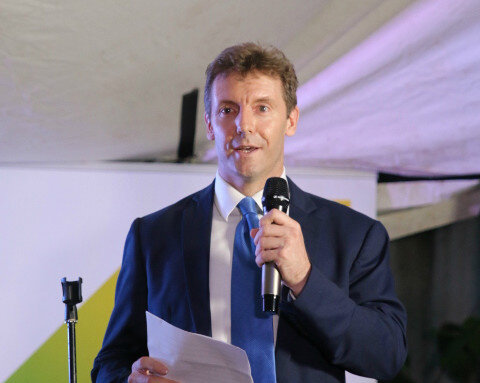The curious case of new UK ambassador to Iran

TEHRAN — On Monday, the Queen of England appointed Simon Shercliff as the new ambassador of the UK to Iran, leaving analysts wondering what does this sudden change of ambassador, which coincided with the presidential election and a new president will take over in the country in mid-August. This intrigued us to do some investigative reporting about Simon Shercliff.
Shercliff joined Foreign and Commonwealth Office in 1998. He began advancing to higher positions pretty soon when he was sent to Tehran as a political officer in 2000. Now, that is not what FCO normally does with its newcomers, is it?
Shercliff entered Tehran in 2000 and left in 2003, in the midst of U.S.-Afghanistan and U.S.-Iraq war. This raised eyebrows. He returned to London to become head of Political Section in Iraq Policy Department. The question remains how does a newcomer advance to such high positions in a short period of time? Can it be related to Shercliff’s mentor, Sir Jeremy Greenstock?
Jeremy Greenstock is the chairman of the strategic advisory company, Gatehouse Advisory Partners, established in September 2010, and chairman of Lambert Energy Advisory, the oil and gas specialists, since January 2012.
He joined Diplomatic Service in 1969 and resigned in 2003. The two themes of his career were West Asia and North Africa and U.S./Western European Relations. He studied Arabic at the Middle East Centre for Arab Studies in Lebanon (1970-72) and went on to serve in Dubai and Saudi Arabia in the early 1970s and mid-1980s respectively.
Greenstock left government service in March 2004. His last position in the FCO was chairing the Security Council’s Counter-Terrorism Committee from October 2001 to April 2003.
He then founded a website in 2010 named the Gatehouse Advisory Partners, which provided geopolitical information to clients. Simon Shercliff served as the Private Secretary of Sir Jeremy Greenstock, the Prime Minister’s Special Representative for Iraq. Shercliff was awarded the Order of British Empire for his work.
Shercliff returned to London in 2004 to the FCO Press Office as a spokesman for Iran and Iraq issues. After a year, he became the Chief Press Officer, then the Foreign Secretary’s Press Secretary.
He arrived in Washington to work on counter proliferation issues in 2006. He then deployed to the British embassy in Kabul between November 2007 and February 2008.
Shercliff then returned to Washington, working on Afghanistan, until 2010. He returned to the FCO in early 2011 as the Deputy Head of the South Asia Department. In 2012 he was promoted to be the Head of the FCO’s Counter Terrorism Department. From February 2014 until December 2016, he was the Deputy High Commissioner in Abuja, Nigeria. Yet, this is just the tip of the iceberg.
Shercliff proved his mentor, Greenstock, that he is more than capable to follow his footsteps. Greenstock served as the SC Counter-Terrorism Chairman, Shercliff served as the Head of the FCO’s Counter Terrorism Department.
Shercliff’s Twitter profile has a lot to say about him. Seemingly, he has close ties with the MENA section of the Crisis Group. And some analysts, who are presenting Iranian President-elect Seyyed Ebrahim Raisi as a hardliner, conclude that he will throw a lot of obstacles in the way of reviving the Joint Comprehensive Plan of Action (JCPOA). These are all analysts throwing stones to the moving train of progress in Iran. Is this a sign that we should not expect Britain to be supportive of change of government in Iran that will follow a different policy?
Up to the point of writing this article, the UK has not taken any stance, official or unofficial, on the outcome of Iran’s June 18 presidential election, unlike its buddies, the U.S. and France. Must we interpret this change of ambassador as UK’s political stance on the matter? Does Shercliff’s political career and affiliations help strengthen Iran-UK ties? Or would it be more weakened? Shercliff served as the UK ambassador to Yemen for just one year, from 2017 to 2018, before moving back to London to serve as the Director of National Security of the FCO.
Since the election hype began in Iran, the Crisis Group began spreading rumors that Iran’s elections will be rigged, presenting Raisi as a pre-announced winner, estimating that the participation would be very low. The high voter turnout and competitive election changed the direction of the Crisis Group. Now they have focused on obstructing the process of reviving the JCPOA, implying that the president-elect will throw immovable obstacles on the way of reviving the nuclear deal to disappoint the P4+1.
Raisi has time and again stated that the JCPOA is an internationally recognized agreement, and any administration that takes charge in Iran should be committed to it. He has likened the JCPOA to “a blank check that must be cashed.” In his first press briefing as the president-elect, Raisi gave a clear message to the United States to return to its JCPOA obligations. Now, the Queen of England appoints someone having close ties with the Crisis Group. This rash decision would implicitly state that the UK does not want the JCPOA to be revived.
The UK, with the appointment of Shercliff, has a tough time mending ties with Iran. It is time for the Queen of England to stop making controversial decisions.
SA/PA
